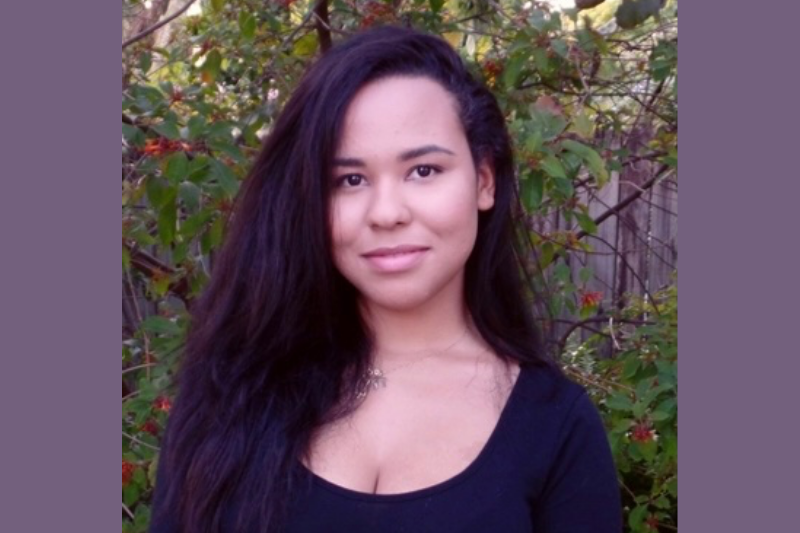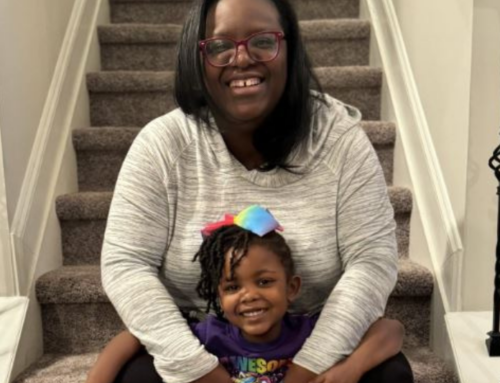Change Matrix’s (CM) latest project is the Early Childhood Systems Technical Assistance and Coordination Center (ECS-TACC) that provides technical assistance to early childhood systems centers to help them provide prenatal care, maternal care, and family services. In many ways, the work is preventative, striving to empower parents with the resources they need to set up a healthy foundation for their children before they are born and to lessen the likelihood that they enter foster care or adoption systems. For CM Change Consultant Chyenne Mallinson, who was adopted at 3 years old, working as a product developer on ECS-TACC resonates with her in a profound way. In honor of November being National Adoption Month, Chyenne is highlighting her lived experience and showcasing why it, together with equity, is foundational to all of her programmatic efforts within this project and her work at CM.
Lived Experience
Growing up, Chyenne led the majority of her formative years in a “pretty privileged,” largely white Jewish neighborhood. Especially conscious of her biracial identity and perhaps because of her past experience in a state-sponsored foster home, Chyenne recalls feeling especially “attuned” to the racism and oppression felt by her friends of color.
“The huge discrepancies in our lives were very apparent to me — especially at a young age,” she said. “Them not being able to be on health insurance, the differences in the education that we got, things like that [stood out]. Young me began to ask, ‘Why is there this gap? Can we bridge it?’”
But this was not the first time Chyenne witnessed inequities, she was affected by many before she was even old enough to talk.
“My birth mother was what I can only assume is a sex worker, and when she was pregnant with me, the first half of her pregnancy, she was abusing substances. During the other half she was actually incarcerated. She was in prison when I was born, and she gave custody of me to her friend — who stopped answering the phone and the police were called and ended up taking me from her,” she said.
At first, Chyenne was taken to live with her maternal grandparents, only to return to live with her birth mother when she was released from incarceration. In Chyenne’s view, had her mother had the opportunity to participate in aid programs and make use of the resources available through a service like ECS-TACC, both her and her mother’s lives would have been drastically different. Unfortunately, however, similar services were not available to them at the time.
“She went back to the same life that she led. She didn’t have a lot of support for dealing with her substance abuse or [other needs],” Chyenne said. “She wasn’t, I guess, ready to be a mother.”
She would spend the next several months accompanying her mother as she continued to seek illicit substances and carry out sex work. It wasn’t until Chyenne was discovered unattended in a car seat on a hot day that child protective services was called to intervene.
“They took me to the hospital and I was examined. That’s where they really found out that I was vitamin deficient, I had an upper respiratory infection — which is why I have asthma now — an ear infection, cradle cap, and they realized that I was kept in a car seat basically my whole life, so I hadn’t reached any developmental milestones,” Chyenne said. “From there, I was taken to a foster home in north Florida with about 10 other kids.”
While she said her experience in a state-run foster home was mostly positive, it did have its negative aspects like a lack of healthy food, outdated methods of punishment, and limited resources. Still, Chyenne was able to receive therapy to reach the appropriate developmental milestones, the medical care she needed, and, at 3 years old, connect with her adoptive family.
Despite all she went through, both within the system and out of it, Chyenne still views herself as very fortunate.
“I was lucky to be placed in a home that was mostly healthy,” she said. “There are a lot of kids that aren’t and they also bounce around a lot. I didn’t bounce. I came from these situations, but because of the family that ended up adopting me I was able to grow and reach these opportunities that a lot of kids don’t get. Many kids start in the same situation that I was in, but they don’t end up leaving the system.”
Centering Equity
Years later Chyenne combined her deep-rooted passion for equity with her service-minded nature and made it the foundation of her career. While at Florida Gulf Coast University, the English major focused on sociological work and women’s and gender studies, traveling also to Thailand to teach English and work on infrastructure and permaculture. Her current work at CM reflects her longstanding commitment to equity as well, as she splits her time between multiple projects like Expanding the Bench®, The National Network to Eliminate Disparities in Behavioral Health, and Healthy Places.
“I told [CM Founding Partner Elizabeth Waetzig] I was interested in helping kids who were in the system like I was. That really caught my attention because the whole point of working with ECS-TACC is working with TA centers and community-based organizations to give mothers and children the resources they need to thrive,” Chyenne said. “If my birth mother had had those resources, she wouldn’t have been in the position that she was in. I wouldn’t have been in the position that I was in.”
In addition to maternal health care, some of the resources ECS-TACC features are children’s health care, family services, and family leadership services that prioritize minority and low-income communities. Chyenne is eager to assist on this project because outside of her clear passion for this work, she’s grateful that her lived experience gives her a clear understanding of what families utilizing the program’s services are going through.
“I don’t know what kind of experience the [current ECS-TACC] TA providers have, but being able to be in the shoes of someone who went through that and being able to relate is so important,” she said.
Too often, she added, care providers suffer from a savior complex rather than a genuine interest in helping clients. She hopes that her participation will not only inform the work that is being done but help prevent cases like her own.
“If we can start from before birth, which is what ECS-TACC is doing, we can tackle these issues that we’re seeing for so many kids in the system — and there are so many mothers that are in the carceral system,” Chyenne said. “If we can combat that from the beginning, I think we can make a huge difference.”




